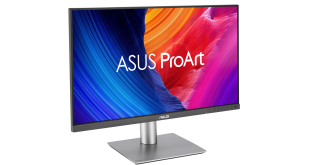Corsair announced the Xeneon Flex OLED monitor last week, and Leo got our first look at Gamescom 2022. More recently however, I had a chance to visit Corsair's UK HQ and get hands-on with this bendy 45in OLED display. We spoke with Corsair about this new screen and asked them plenty of questions, including several submitted by our own readers and viewers. Want to know more about this rather bonkers monitor? We've got the answers…
Timestamps
00:00 Start
00:26 Introduction to the Xeneon Flex OLED
01:42 How did this happen?
02:54 Who would actually bend a screen – who’s it for?
04:19 Discussion on the curvatures
04:53 What’s expected to change with final retail versions?
05:55 Is it possible to use third-party stands/mounts?
06:37 45in 3440×1440 – too low resolution?
08:07 Peak brightness – HDR and full screen
08:23 Burn in prevention and warranty
09:28 Will bending affecting the panel quality/pixels?
10:40 Pricing and availability
11:05 Will there be more bendy screens in the future?
If you missed the original announcement and Leo's initial look at Gamescom 2022, the Corsair Xeneon Flex OLED is unlike any other monitor we have ever seen. Using a 45in 3440×1440 OLED display from LG, Corsair has designed the Flex to, well… flex.
We mean that quite literally, as the monitor physically bends when you pull on the handles positioned on the left and right side. It is adjustable from being completely flat, out to an impressive 800R curvature. Right now, there's three intermediate steps between flat and 800R, but Corsair tells us they are still fine-tuning the mechanism, as we saw a fairly early prototype.
The bendable nature of this screen certainly raises a lot of questions, and we posed several of them to Corsair in the video above, including concerns about longevity and who would actually use this feature, so be sure to check it out.
Moving on, we don't want to say ‘aside from the fact the screen is bendable', as that is clearly a unique and defining feature of the Xeneon Flex – but even leaving that to one side, the underlying OLED screen used here is impressive. It's a RGBW OLED panel manufactured by LG, with a 3440×1440 resolution and 240Hz refresh rate. Corsair claims a 0.03ms grey-to-grey response time, something we will be able to test for ourselves in the future, and there's also a 1000 nit peak brightness. We clarify in the video that is referring to a 3% window size in HDR, and full-screen sustained brightness is 150 nits.
The resolution is an area of concern for some, and this was actually the question we were asked most by our readers and viewers. The full discussion on this aspect of the screen takes place at 06:37 in the video above, but Corsair told us when sat at a typical viewing distance of 60-80cm, suitable for a screen of this size, the relatively low pixel density is not a concern. 240Hz was apparently a key focus for LG too, which combined with OLED's near-instant response times should make for an incredibly clear gaming experience.
Corsair tells us they are currently ramping up production and expect on-shelf availability in early 2023. We still have no word on pricing, but an educated guess would put it north of £2000, possibly closer to £3000. Alienware's QD-OLED AW3423DW is £1099 for example, and that is smaller, offers a slower refresh rate and of course doesn't bend, so this will certainly be a screen for only the most cash-rich of enthusiasts.
We hope to get a sample in for a full review in the coming months.
Discuss on our Facebook page HERE.
KitGuru says: It's not often we see a truly unique product, but the Xeneon Flex certainly fits the bill. After a couple of hours with it, I'm already itching for more.
 KitGuru KitGuru.net – Tech News | Hardware News | Hardware Reviews | IOS | Mobile | Gaming | Graphics Cards
KitGuru KitGuru.net – Tech News | Hardware News | Hardware Reviews | IOS | Mobile | Gaming | Graphics Cards










